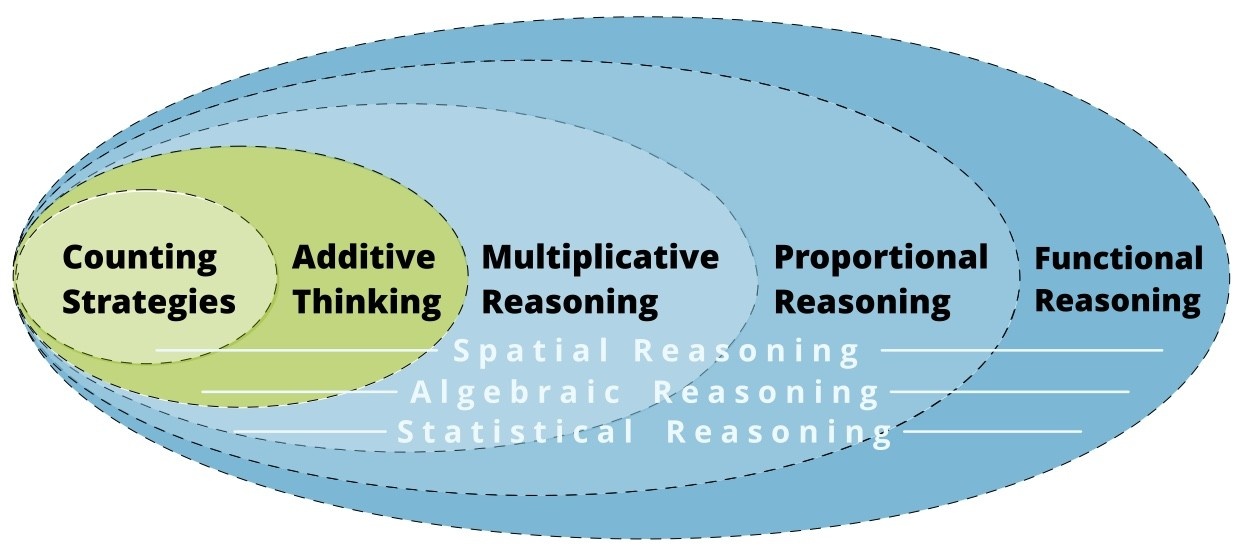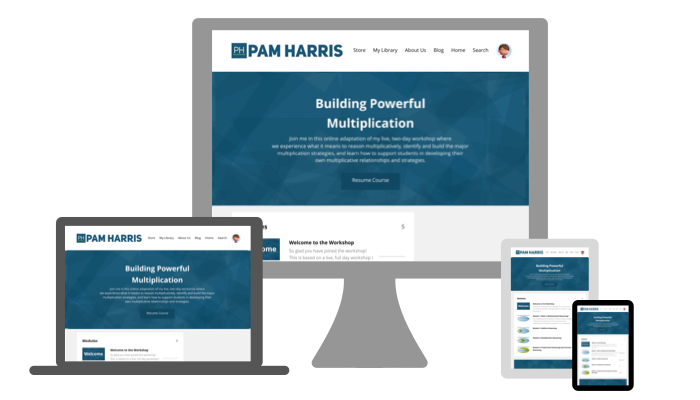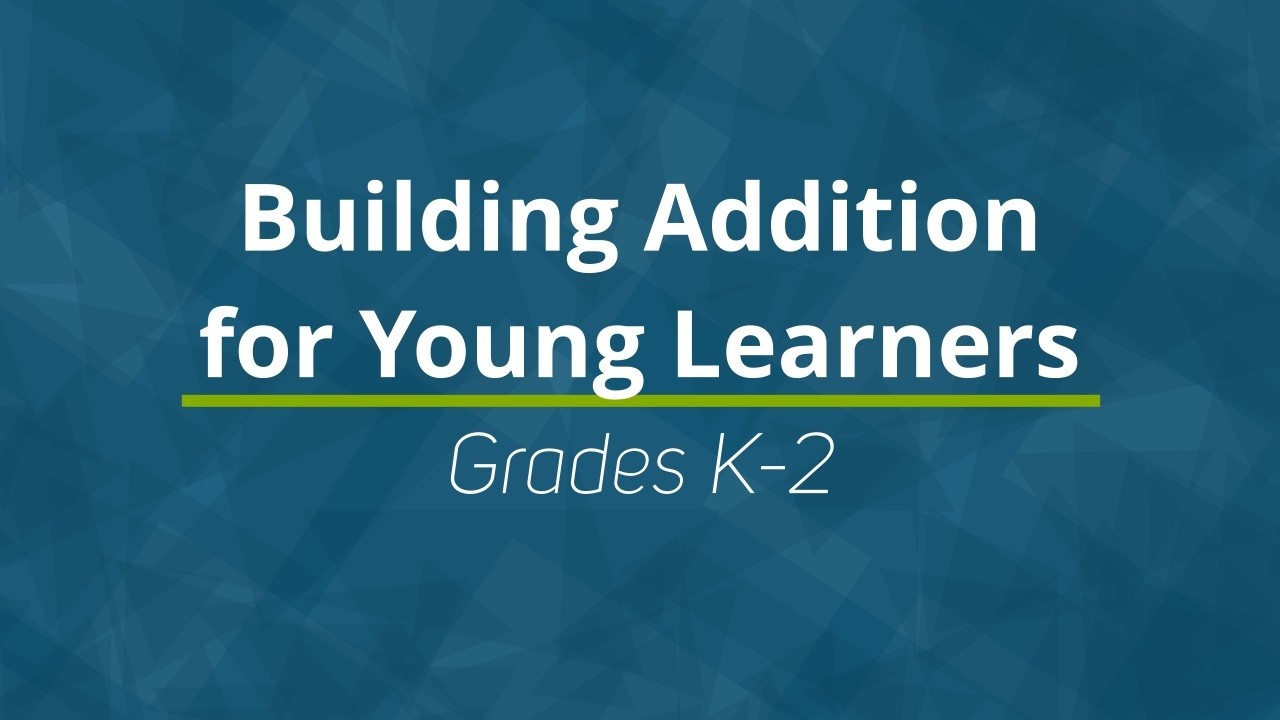What is in the Workshop?
Module 1: What is Additive Reasoning?
What Will I Learn?
- What "Math is Figure-Out-Able" means, what is real math, and what it means to mathematize
- How to help students think like young mathematicians
- Why it is important to develop reasoning, not just get answers
- Two important addition relationships and strategies
- Steps to take action in your classroom
Why Is This Important?
This is the why, the background, the setting that sets the stage for the rest of the workshop, so that you can implement lessons and strategies knowing how it all fits together.
___________________________________________________
Module 2: Building Counting Strategies
What Will I Learn?
- What the various counting strategies are and what they can look like
- What the big ideas are young learners need to develop
- How to use a Landscape of Learning framework to recognize and plan for mathematical growth
- What the various problem types are and how rigor is affected
- How to help students grow their brains into more sophisticated thinking
Why Is This Important?
Learning to count is more than just singing the names of the numbers in order. Young students have so much to learn about one-to-one correspondence, numbers and quantity, and magnitude and hierarchy.
Giving students valuable experiences to develop these big ideas is not trivial. Teachers need to know the major milestones and how to help students develop these milestones.
___________________________________________________
Module 3: Building Single-digit Addition
What Will I Learn?
- What the important additive relationships are that students need to build to own their addition facts
- How to help young learners construct the meaning and language of “teens”
- How to use the visual structure of the number rack and number line to support student growth
- How to represent student thinking on the open number line
- Instructional routines, Problem Strings, and games to build numerical relationships and develop additive strategies
Why Is This Important?
Moving young learners from counting to additive thinking is necessary for their brains to construct neural pathways of increased sophistication. Students may be able to get answers to addition problems through counting by ones, but they need to be able to think in groups larger than ones.
Students need to construct relationships between numbers in order to manipulate them with purpose and efficiency. Students benefit from seeing addition on models as visual representations of numerical and spatial relationships.
___________________________________________________
Module 4: Building Place Value Understanding
What Will I Learn?
- Rich Task Activities to build the big idea of equivalency
- How the place value understanding is more than just place value labeling
- A Problem String to support and build place value equivalencies
- What the instructional routine “Count Around” looks like and how it can help build place value understanding and additive thinking
Why Is This Important?
As students move beyond single-digit addition, they need to understand and have facility with our place value system in order to continue to construct relationships between numbers. Students need time and experience messing with our complicated number system in order to make sense of the multiplicative relationships conveyed through the location of digits.
This module focuses on how to build deep understanding of our base 10 system through multiple activities and instructional routines.
___________________________________________________
Module 5: Building Multi-digit Addition
What Will I Learn?
- The 4 essential addition strategies students need
- How to build the important model of the open number line
- Which models are for building relationships and which models are efficient for computing
- How models and strategies work together and how they differ
- Games that support additive thinking and are easily differentiated
- How to use Problem Talks for formative assessment
- Steps to take action in your classroom
Why Is This Important?
You can solve any addition problem – that's reasonable to solve without a calculator - by using one of the four major addition strategies. It's not about a huge, undefinable set of strategies. Rather, it's about building relationships in students' minds so that these strategies become natural inclinations. Students look at the problem and let the numbers dictate the strategy based on the inherent relationships.
To construct these relationships, students need visual representations of addition as numerical and spatial relationships. Students also need to transition to use those models as tools for thinking. Teachers need to know the progression of models, which ones are transitional and temporary, which ones support efficient computing, and how to model-represent student thinking.
___________________________________________________
Module 6: Top 3 Types of Tasks for Student Success
What Will I Learn?
- Rich tasks to develop concepts
- Problem Strings to introduce and solidify strategies, models, and concepts
- Problem Talks to compare strategies
- How to sequence lessons to maximize learning
- Steps to take action in your classroom
Why Is This Important?
This is the how-to-do-it module. We study different types of instructional tasks and routines, discerning their role in constructing mathematical ideas in learners’ brains. Our goal is to always be moving the math and the mathematician forward. Understanding how to use and leverage different instructional tasks allows you to ensure success for all your students all of the time.
___________________________________________________
Module 7: High-leverage Teacher Moves to Move the Math Forward
What Will I Learn?
- High leverage teacher moves to encourage student sense making
- Teacher moves that support equity and access
- Teacher moves to differentiate — to support and challenge all learners
- How to support meaningful discourse to facilitate learning
- Steps to take action in your classroom
Why Is This Important?
Teaching in a way that allows all students to learn and grow is not a trivial task. In this module, you’ll learn the high-leverage teacher moves that make the learning happen like a pro.
___________________________________________________
Live Q&A Sessions With Pam
During the workshop you will have the opportunity to submit questions to Pam for her to answer during two live Q&A sessions. The sessions will be recorded and you will have access to them.




